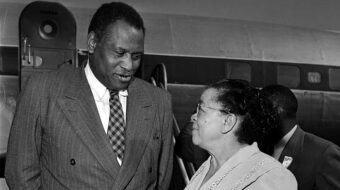A Stranger to Myself: The Inhumanity of War, 1941-1944
By Willy Peter Reese
Published by: Farrar, Straus and Giroux, 2005
176 pages
As a German soldier on the frontlines of Hitler’s war machine, Willy Peter Reese endured and inflicted the unimaginable, saw the horrible and came face-to-face with the life and death realities of war. A Stranger To Myself is his testimony, his condemnation of the insanity of war, of the brutalities which ordinary people will inflict upon each other. It is his journal, a diary for the tormented soul seeking comfort from the inescapable daily prospect of death and dying.
A Stranger To Myself isn’t just important as a historical document. It isn’t just important because it tells us what one individual thought, wrote and dreamed during war. It is important because of what it tells us about the human ability to endure, to try to make sense out of the unintelligible, to find reason in chaos.
Reese was drafted into the German military as Hitler drove his machine of death and destruction east into the heart of the Soviet Union. He wasn’t a racist or an anti-Semite. He was a young, naive boy who dreamt of far-off lands, different cultures and adventure. “I was still young enough,” he writes, “to desire anything new, to relish the excitement of the journey, and to intoxicate myself with dreams and fantasies. I didn’t think much of death and danger…”
Throughout A Stranger To Myself we witness the horror and brutality, but more importantly we witness the emotional transformation of Reese as he begins his journey. We get glimpses of the boy, of the naivety. He writes, “…we came under fire from a column of tanks and had to bury our heads in the snow. A yelled prayer went up to us to keep our discipline. We weren’t praying for our lives; we called out for courage, to keep us strong and proud, and save us from cowardice. Cowardice was worse than death, and even a peaceable fellow like me despised anyone who trembled for his life and sought to avoid ruin. I loved to prove myself in danger.”
As Reese’s story unfolds, as he endures the harsh, numbing cold of the Russian winter, as his comrades fall around him, as the endless, sleepless frozen nights begin to take their toll, as the frostbite and blood and guts, and madness envelope him, we begin to read Reese as a cynic, as a desperate person acting desperately in desperate situations. We begin to see him as someone just trying to stay alive, without illusions.
Make no mistake, Reese wasn’t innocent of brutalities. In war, no one is innocent. But that is the point. War, regardless of who is right or wrong, makes us slaves to the necessity of survival. And during war survival is often brutal; it comes with a price – the death of others, or the death of the soul.
As the war continues Reese’s journal entries become more matter of fact. He just describes the brutality, as if he were reciting a scene from a play.
For example, on Christmas Eve “we torched all of the villages we passed through and blew up all of the stoves. We had been ordered to spread devastation, so that our pursuers could find no shelter. We obeyed, and our self-loathing overpowered even our joy at being released. Women wailed, children froze in the snow, and curses followed us. Soon we stopped asking. When we were issued a supply of cigarettes, we lit them at the burning houses.”
The winter was especially devastating to the spirit. “We had no winter clothing and never really got warm. Our perpetually cold feet hurt. Every footfall hurt…[but] frostbite could be interpreted as self-mutilation. Our chilled guts couldn’t deal with food. Everyone had diarrhea, and some had diphtheria. One was so enfeebled that he broke down on the way to the doctor and froze to death.”
Finally, Reese couldn’t take the cold, the death, the inner-pain. On one especially brutal night, after “cursing God,” Reese did the unthinkable. “In the harsh sunlight, I crawled out of the bunker and stood up. One bullet whistled by. The second hit. That was salvation.”
Reese lived for another year. After returning to the front, he continued to make journal entries until death came for him.
A Stranger To Myself isn’t a glorification of war. It isn’t the German perspective. It is a modest attempt to articulate the emotional horror inflicted on the mind of a young soldier. It is an important contribution to WWII historiography.












Comments